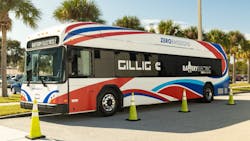It’s official: PSTA is going green
Over the next five years, the Pinellas Suncoast Transit Authority (PSTA) will purchase 60 electric buses, the latest step in PSTA’s ongoing mission to transform the fleet to clean and green by 2050.
PSTA says electric buses are more efficient, better for the environment and will have improved health outcomes for the communities they serve.
PSTA’s electric buses will operate systemwide with the first of the 60 new buses expected to hit the road in 2024. PSTA already operates six all-electric, green buses. This announcement comes after PSTA unveiled four electric depot bus chargers in June of 2021.
Last month, the PSTA Board of Directors approved electric bus purchasing contracts with four leading electric bus manufacturers. It is the first all-electric bus consortium in the state of Florida.
“PSTA is determined to deliver on the promise of a zero-emissions fleet by 2050,” said PSTA CEO Brad Miller. “Last month, the Biden Administration signed into law the largest investment public transit has realized in US history to improve transportation options and reduce greenhouse emissions for millions of Americans. PSTA is leading the way for our region to meet our green goal.”
Each electric bus is recharged one of three ways: overnight charging, regenerative braking and on-route charging stations. The battery range averages 200 miles or about 14 hours of operating time on a single charge. PSTA will save about $20,000 a year in diesel fuel costs with each electric bus.
“Pinellas County is pleased to support PSTA’s transition to a zero-emissions buses by modernizing the fleet over the next five years,” said Pat Gerard, chair of PSTA’s Board of Directors. “Through this electric vehicle investment, we are ensuring that Pinellas County residents benefit from cleaner air as we move toward a more sustainable, carbon-free energy system.”
Electric buses cost less to run than diesel, are easier to maintain and each electric bus reduces 135 tons of carbon emissions from the air per year by providing public transit services as an alternative to personal vehicle use, according to PSTA.
By eliminating diesel exhaust emissions, particulate pollution and pollutants that contribute to the formation of ground-level ozone, they improve the air quality in communities.
“PSTA is taking major steps toward fulfilling its aspiration of a fully green fleet by 2050,” said Miller. “More zero-emission buses, as well as charging infrastructure, will reduce emissions and improve air quality that impacts public health locally, while contributing to an overall effort to combat climate change and sea level rise.”
